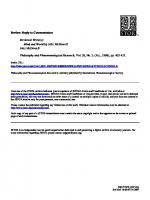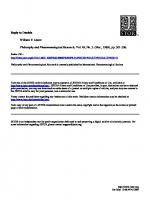
- Author / Uploaded
- Fodor Jerry
Reply to Professor Zaitchik
Jerry A. Fodor Philosophy and Phenomenological Research, Vol. 42, No. 2. (Dec., 1981), pp. 292-293. Stable URL: http://
1,240 20 41KB
Pages 3 Page size 595 x 792 pts Year 2007
Recommend Papers
File loading please wait...
Citation preview
Reply to Professor Zaitchik Jerry A. Fodor Philosophy and Phenomenological Research, Vol. 42, No. 2. (Dec., 1981), pp. 292-293. Stable URL: http://links.jstor.org/sici?sici=0031-8205%28198112%2942%3A2%3C292%3ARTPZ%3E2.0.CO%3B2-P Philosophy and Phenomenological Research is currently published by International Phenomenological Society.
Your use of the JSTOR archive indicates your acceptance of JSTOR's Terms and Conditions of Use, available at http://www.jstor.org/about/terms.html. JSTOR's Terms and Conditions of Use provides, in part, that unless you have obtained prior permission, you may not download an entire issue of a journal or multiple copies of articles, and you may use content in the JSTOR archive only for your personal, non-commercial use. Please contact the publisher regarding any further use of this work. Publisher contact information may be obtained at http://www.jstor.org/journals/ips.html. Each copy of any part of a JSTOR transmission must contain the same copyright notice that appears on the screen or printed page of such transmission.
JSTOR is an independent not-for-profit organization dedicated to and preserving a digital archive of scholarly journals. For more information regarding JSTOR, please contact [email protected].
http://www.jstor.org Sat May 12 01:05:12 2007
DISCUSSION REPLY TO PROFESSOR ZAITCHIK Professor Zaitchik's "defense" of physicalism would have gladdened the heart of Mr. Pickwick, but it gladdens not mine. My point was that, on what seem plausible assumptions about the noncoextensivity of physical and psychological kinds, we must give up either (1) the reduction of intensional to physical explanation, or (2) the construal of intensional theories as enunciating true causal explanations. What Zaitchik has done is simply to opt for (2), accepting the consequence that there may be n o science in which we can articulate such causal explanations as our linguistics, our decision theory, our psychology of perception, our learning theory, etc., now appear to provide. There will be no such science if, as could well turn out, our neurology (or our physics) provides no projectable predicates coextensive with those that our intensional sciences deploy. In that case, on Zaitchik's view, there will be an explanation of the fact that certain formulae occur in all optimal computational models of the organism, but those formulae will be - as it were -mentioned rather than used. The success of the computational models will therefore not be explained in the way that we explain the successes of other highly valued scientific theories: viz., by the assumption that they are true. We will be able to say- to put it vulgarly- that and why "if you itch you want to scratch" occurs in all optimal models, but we will not be able to say that it is because if you itch you want to scratch. Indeed, we will not, ex hypothesi, be able to say that if you itch you want to scratch at all, no projectable predicates coextensive with 'itch', 'want' and 'scratch' having been provided. That is what it is like to give up your psychology on grounds of physicalist prejudice. But now: if it is not an objection to the physicalist methodology that it rules out on a priori ground what appear to be scientific explanations in good standing, what would be an objection to that methodology? By the way, the putative counterexample in footnote 7 cuts no ice since, in the circumstances imagined, the token of "peck here now" is not functioning as a representation of a rule (or of anything else) in the etiology of the pigeon's behavior; it is just ,.functioning as a discriminative stimulus. What this shows is only what is obvious on independent grounds: that to flesh out the intensionalist story we need 292
an account of what it is for a token to represent - and, more generally, for something to be a token of a formula in a system of representations. I see no reason to doubt that this can be done; certainly Zaitchik has given no argument for doubting that it can. If it can, then the idea that intensionally characterizable behavior is behavior in which mental representations are causally implicated will be just what we need to explain why the postman is - and the planets are not -following rules in the execution of their appointed routes.
JERRY A. FODOR. MASSACHUSETTS INSTITUTE OF TECHNOLOGY.









